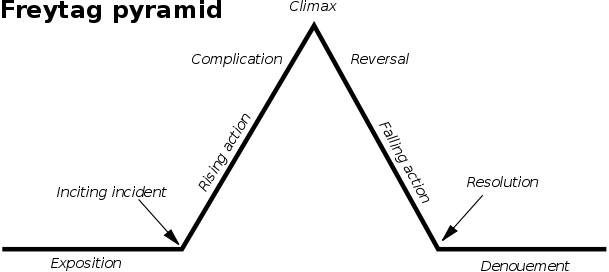Form
1/7
Earn XP
Description and Tags
Name | Mastery | Learn | Test | Matching | Spaced | Call with Kai |
|---|
No analytics yet
Send a link to your students to track their progress
8 Terms

Freytag’s Pyramid
Exposition - establish story, character, setting
Inciting incident - suspense (Polonius’s Death)
Rising action - events start and tension
Complication - something goes wrong
Climax - peak of conflict and peripeteia
Reversal - protagonist fortune change
Falling action - evolves and becomes clear, less tension
Resolution - problem resolved
Denouement = unknotting
Revenge tragedies
Catharsis - releasing and thereby providing relief from strong repressed emotions
Hubris - excessive pride
Hermatia - fatal flaw or error of judgement
Mimesis - drama imitates life
Peripeteia - reversal in fortune brought about by the hero’s error in judgment
Anagnorisis - discovery that reversal was bought about by hero’s own actions
Closet drama - plays to be read rather than performed
Audience listening not watching
Revenge tragedy conventions
Avenging hero is killed
Spectacle for the sake of spectacle (dramatic violence)
Villains/accomplices are killed
Supernatural forces urging protagonist to seek vengeance
Play within a play
Madness or feigned madness
Disguise
Violent murders
Soliloquies
Machiavellian figure (selfish/sly)
Fifth and final act where many die
Degeneration of a once noble protagonist
Ancient Greek Tragedy
500 - 200 BC
Hermatia and catharsis
Heroes and death
Aeschylus - c.524-455 BC, father of Greek tragedy
Sophocles - c.497-406 BC, philosopher
Euripides - c.480-406 BC, greatest influence of western tradition of drama
Aristotle - Hermatia, huberis, philosopher
AC Bradley - wrote a book about Shakespeare’s tragedies
Shakespeare tragedy features according to AC Bradley:
One central ‘hero’ character
Structurally leads to death
Hero cannot be alive at end
Medieval tragedy —> riches to rags
Person of a high degree
Calamities proceed mainly from actions of men
Interconnected deeds leads to catastrophe
Hero contributes in some measure to disaster
Idea of conflicting “spiritual force” e.g. loyalty and revenge at work driving a man’s soul
Importance of actions or deeds typical to certain type of character - calamities and catastrophe follow inevitability from the deeds of men Interconnected. Exceptions are madness, supernatural and accident
Hegel
Theory of conflict in tragedy
Hamlet vs King
Roman Tragedy
Educated men likely to have a better grasp on Latin than Greek. Schoolboys acted in ancient Roman comedies
Seneca
5 acts
Physical violence
Competing desire and passion
Highly-wrough, complex, ambitious language